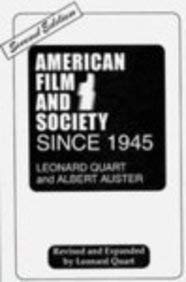Quart and Auster survey many of the public classics--fictional films whose critical acclaim, awards, or box office appeal indicate a connection with public consciousness--that have been produced in the United States since 1945. They analyze the cultural and social significance of these films, and how the formal elements of these works helped shape cinematic art. Their premise is that if Hollywood is the dream factory, then the post-World War II film--from The Best Years of Our Lives and Do the Right Thing--helps to unravel some of the central concerns and values of American society between 1945 and the present.
This revised, expanded, and updated edition emphasizes the films of the 1980s, discussing ideologically antithetical Vietnam films such as Platoon and Rambo, feminist backlash films like Fatal Attraction, rural sagas such as Places in the Heart and Country, teen films such as Risky Business and Back to the Future, and films dealing with the civil rights struggle, black history, and black contemporary life such as Mississippi Burning, Glory, and Do the Right Thing. This book also explores the contested and contradictory meanings conveyed by many American films such as Sylvester Stallone's Rambo, which is seen as both a patriotic, pro-war cartoon and a populist attack against government experts and bureaucracy. This uniquely accessible political, cultural, and aesthetic analysis of post-World War II Hollywood films can be read and enjoyed by students, teachers, and the general public alike.
LEONARD QUART is Associate Professor of Cinema Studies at the College of Staten Island-CUNY and an editor of Cineaste. In addition to co-authoring the first edition of American Film and Society Since 1945, he has co-authored How the War Was Remembered: Hollywood and Vietnam (Praeger, 1988), and has published articles and essays in The Time Out Film Guide, British Film Institute Companion to the Western, Film Quarterly, American Media and Mass Culture, and Newsday.
ALBERT AUSTER teaches in the Communication Department of the State University of New York at New Paltz. He is author of Actresses and Suffragists: Women in the American Theater, 1890-1920 (Praeger, 1984) and co-author of How the War Was Remembered: Hollywood and Vietnam (Praeger, 1988). He contributes regularly to Television Quarterly and the Journal of Popular Film and Television.
